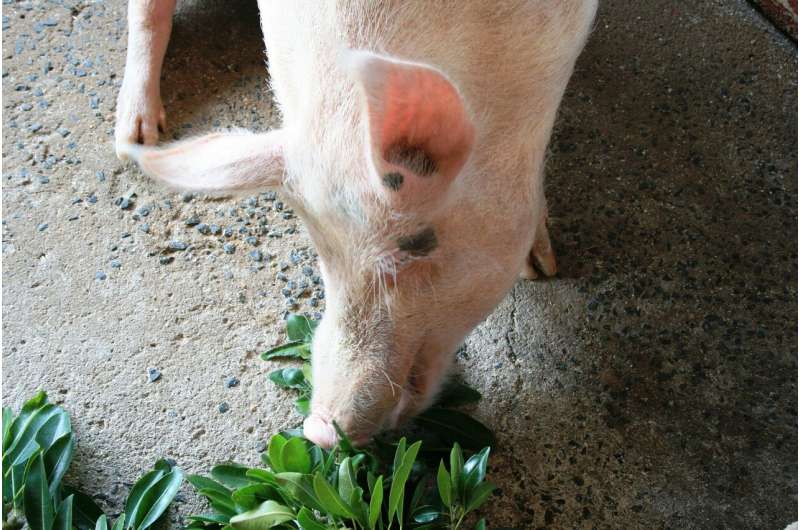
Copper is a natural antimicrobial material that, when added to pig feed, may promote the growth and health of the animals. Since pigs can tolerate high levels of the metal, researchers at Texas Tech University in Amarillo recently investigated whether copper might be used to promote their gut health and reduce the shedding of microbes to the environment.
This week in Microbiology Spectrum, the researchers report that small beads containing copper, when added to pig feed, effectively deliver the metal to the animal gut.
“The copper gets released in the animal system very slowly,” says microbiologist Alexandra Calle, Ph.D, the paper’s senior author. Instead of just being consumed and absorbed in the stomach, it remains for a longer period in the animal’s GI tract.
In the lab, Calle and her colleagues found that exposing Salmonella to the copper bead solution resulted in dramatic reductions in the population of the bacterial pathogen. Based on those results, they hoped that their animal experiments would show that the copper beads could reduce microbial pathogens in the gut, as well.
They divided a group of 48 6-month-old pigs—half female, half male—into two groups. During the second week of a 3-week study, the first group received normal feed, and the other received feed with added copper beads. Researchers collected feces from the pigs throughout the experiment, using atomic spectroscopy to measure copper levels and 16s RNA sequencing to identify microbial species.
Calle and her colleagues selected two families of bacteria to study as indicators of how the copper changed the gut microbiome. One was Enterobacteriaceae, a large collection of microbes that includes Salmonella, Shigella, Escherichia coli and others, including many that can be pathogenic. The other family included lactic acid bacteria, which have been linked to health or nutritional benefits.
Animals in the experimental group had about 20 times as much copper in their feces as animals in the control group, and after they stopped receiving copper their levels of the metal returned to baseline. Those measurements confirmed that the beads had effectively delivered the metal.
Analyses of the microbial populations showed that the copper additive led to higher levels of Enterobacteriaceae and lower levels of lactic acid bacteria in the control group—which wasn’t the change the researchers had hoped to see.
“Even though our desired target was to reduce levels of Enterobacteriaceae, the opposite happened,” Calle said. She suspects that after the copper diminished levels of the lactic acid bacteria, the Enterobacteriaceae had an easier time colonizing the gut.
Despite those findings, though, they’re not discouraged. “This was our first test of this project,” Calle said. The ultimate goal of the research, she said, is to design what researchers call a “pre-harvest intervention,” which would enhance the gut health in the animals before they’re slaughtered and processed for food.
The next step toward that goal, she said, is to use the beads to target specific, pathogenic microbes and optimize the gut health benefits.
More information:
Mariana Fernandez et al, Novel feed additive delivers antimicrobial copper and influences fecal microbiota in pigs, Microbiology Spectrum (2024). DOI: 10.1128/spectrum.04280-23
Citation:
Study shows copper beads in pig feed reshape swine gut microbiome (2024, April 17)
retrieved 17 April 2024
from https://phys.org/news/2024-04-copper-beads-pig-reshape-swine.html
This document is subject to copyright. Apart from any fair dealing for the purpose of private study or research, no
part may be reproduced without the written permission. The content is provided for information purposes only.







